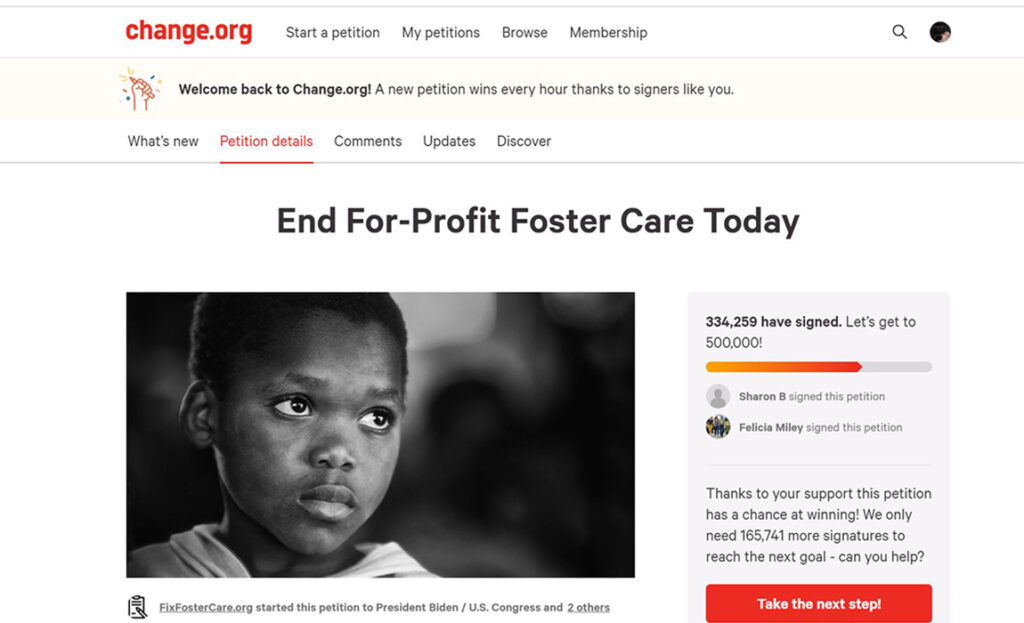Critics say the move would exacerbate the existing shortage of foster homes

More than a quarter-million people have signed a petition calling on the federal government to ban for-profit companies from the network of homes and institutions caring for the nation’s foster children.
Organizers with a coalition of leading advocacy groups aim to accumulate 430,000 signatures — one for every child living in American foster care — before heading to Capitol Hill to make their case to lawmakers.
The movement to “stop the placement of foster children for commercial profit” is fueled by a string of media reports in recent years detailing at-times deadly abuse inside foster homes and facilities managed by for-profit corporations such as Sequel Youth & Family Services and the Mentor Network.
In an investigation published in December, The Imprint and The San Francisco Chronicle reported that children placed at Sequel-run residential treatment programs had been slapped, punched and choked by staff. Hundreds of California foster and probation youth were placed out-of-state in programs run by the Alabama-based company, even though state law prohibits such use of for-profit foster care providers.
“These are children — they don’t vote, they haven’t got any money, they will never march, they don’t chain themselves to the railings, they don’t employ lobbyists,” said campaign spokesperson Peter Samuelson, founder and president of First Star, a nonprofit focused on education access in foster care. “Nothing is going to change unless we do something.”

The organizers of the Fix Foster Care campaign — a coalition including the advocacy group Children’s Rights, and The American Professional Society on the Abuse of Children among others — contend that foster children whose cases are handled by for-profit companies are subject to less stability, more frequent moves and overall poorer quality of care.
“Foster care should not be run by for-profit companies under dubious contracts with governments that benefit stockholders at the expense of children’s best interests,” the online petition states.
Privatized foster care is defined as governments employing outside organizations to serve children removed from their parents’ homes due to neglect or abuse. Both for-profit companies and nonprofit organizations offer these services which can include residential care, case management and foster family recruiting, licensing and management of homes.
Campaign organizers want to prohibit for-profit companies from being part of this network of care. They say this work should only be done by government agencies or nonprofit organizations, both of which are subject to more stringent oversight and transparency requirements than private businesses.
“I’m signing because the kids affected can’t,” wrote Jessica Krob, one of more than 300,000 people who have signed the petition to date.
Concerns around privatized foster care received greater scrutiny in 2020 with the release of “Foster Boy,” a feature film produced by Samuelson, with NBA superstar Shaquille O’Neal as executive producer. The film was written by Chicago attorney Jay Paul Deratany, based on his cases representing foster youth in multi-million-dollar lawsuits against private foster care providers.
Representatives of behavioral health providers take issue with the campaign to end private foster care. They say there’s already a shortage of children’s residential treatment and foster care resources, especially for youth with complex needs, and that eliminating for-profits would further strain the system.
“This has real potential to hurt the children and youth that they’re purporting to help,” said Shawn Coughlin, CEO of the National Association for Behavioral Healthcare, which represents both for-profit and nonprofit residential facilities serving foster youth as well as therapeutic foster care providers.
To be sure, abuse has also been uncovered at nonprofit foster care providers, including at the Pennsylvania-based Devereux Advanced Behavioral Health, a leading nonprofit provider nationwide. Last year, The Philadelphia Inquirer reported on decades-long sexual abuse of children at Devereux facilities. The newspaper also revealed a culture of abuse at Glen Mills School in Pennsylvania, the nation’s oldest reform school of its kind, before the exposure shut it down.

“Tax status does not give you an indicator of, this is a better system or a worse system,” Coughlin said.
The Fix Foster Care campaign does not take issue with contracting out foster care services to these nonprofit providers.
Privatized foster care has been debated in the child welfare field for years.
Most states and counties outsource at least part of their foster care services, while some have privatized their statewide system. Concerned about profits eroding quality, California prohibited for-profit foster family agencies and residential treatment providers from operating in the state.
Kayla Muzquiz, a youth organizer with the Fix Foster Care campaign, said members hope more state and local governments will follow suit, although the ultimate goal is federal legislation.
Muzquiz was sent to a series of for-profit group homes, wilderness programs and treatment centers in Texas, Utah and North Carolina after her mother died and she was abused by her father. She called the facilities “cultish” environments where she was often physically restrained by staff and denied health care, resulting in a thyroid condition being misdiagnosed as mental illness.
In a blog she wrote for Children’s Rights, she wrote: “The meds they put me on threw my moods all over the place. I wanted to kill myself. I feel lucky I made it out alive.”
But when she tried to advocate for herself, she said, she was quickly shipped off to a different facility or home. From age 12 until she left the system at 18, she moved between a handful of for-profit facilities and wilderness programs in three states. “In each of them the people seemed more interested in treating me as a problem to be passed around,” she wrote, “rather than a child in need of real help.”
The treatment she received under the care of private foster care providers, the 24-year-old Texan said, has left her permanently disabled and dependent on medication.
“All of that was, and still is, being funded by our tax dollars,” she said in an interview with The Imprint. “That’s what I want people to really know and focus on — that we can’t be complicit.”
In 2017, the U.S. Senate Finance Committee researched the issue and found troublingly lax oversight leading to poorer outcomes for kids raised under the care of private contractors.
“State child welfare agencies report they have procedures in place to monitor child welfare providers’ performance and outcomes,” the report said. But investigators found these “policies are not always followed; exceptions are made, waivers are granted, profits are prioritized over children’s well-being, and sometimes those charged with keeping children safe look the other way.”
Still, with the exception of calling out one for-profit foster care provider, Mentor, the 2017 Senate report found no evidence that children overall fared any worse when their care was contracted out to for-profits rather than nonprofits. And a subsequent bill aimed at increasing federal oversight of private foster care providers failed to become law.
Coughlin, with the National Association for Behavioral Healthcare, said for-profit and nonprofit providers in the field bring different strengths. For example, having more capital on hand affords for-profits “the flexibility to build and start programs that otherwise may not be available.”
“Not-for-profits generally don’t have those resources to expand,” he said. And, he added, the economies of scale at large for-profit providers allows for lower-cost care “without at all jeopardizing the quality.”
Samuelson of the Fix Foster Care campaign wants lawmakers to decide. He said members plan to meet with Congressional and White House staffers next month.
They are motivated in part by the fight against for-profit prisons, bolstered by President Joe Biden’s January executive order barring their use in the federal justice system. The campaign has recently merged efforts with the National Juvenile Justice Network to protest for-profit youth detention centers.
“If it isn’t good enough for convicted felons,” Samuelson said, “who in their right mind would think that it’s good enough for pure-as-the-driven snow, never-did-anything-wrong, abused or neglected children?”





